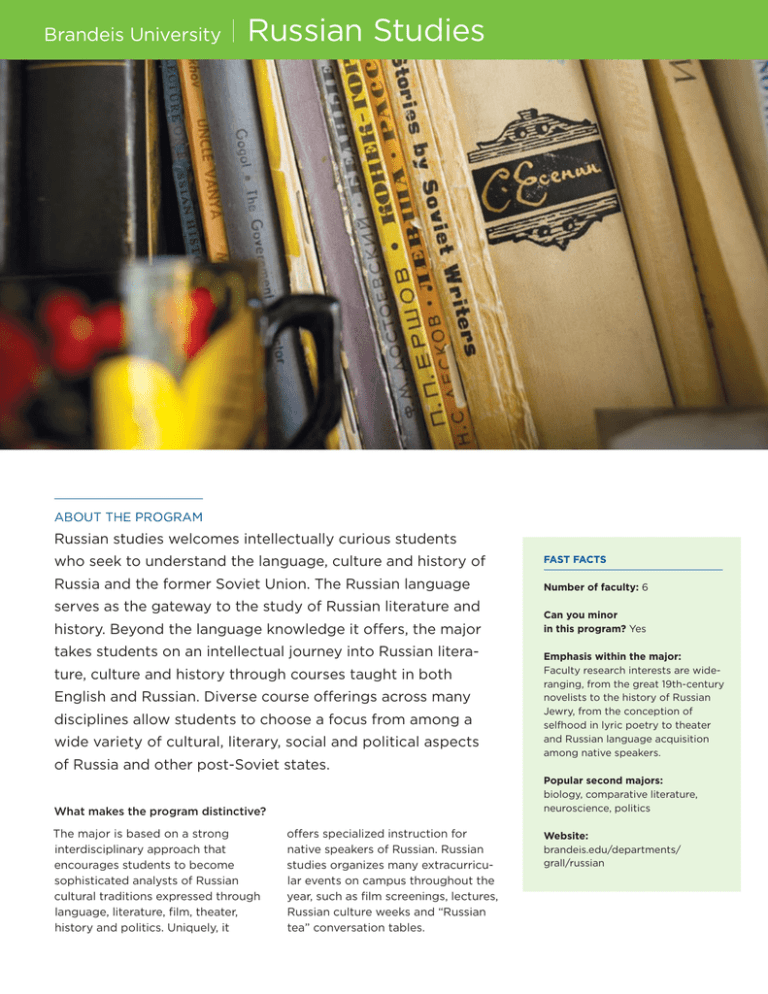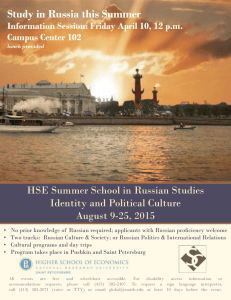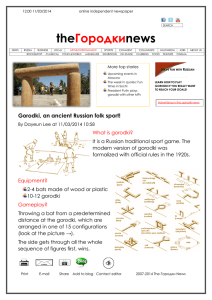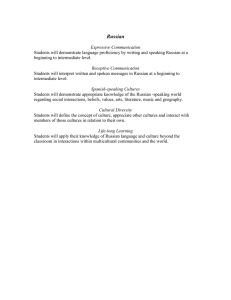Russian Studies Brandeis University
advertisement

Brandeis University Russian Studies about the program Russian studies welcomes intellectually curious students who seek to understand the language, culture and history of fast facts Russia and the former Soviet Union. The Russian language Number of faculty: 6 serves as the gateway to the study of Russian literature and history. Beyond the language knowledge it offers, the major takes students on an intellectual journey into Russian literature, culture and history through courses taught in both English and Russian. Diverse course offerings across many disciplines allow students to choose a focus from among a wide variety of cultural, literary, social and political aspects of Russia and other post-Soviet states. Emphasis within the major: Faculty research interests are wideranging, from the great 19th-century novelists to the history of Russian Jewry, from the conception of selfhood in lyric poetry to theater and Russian language acquisition among native speakers. Popular second majors: biology, comparative literature, neuroscience, politics What makes the program distinctive? The major is based on a strong interdisciplinary approach that encourages students to become sophisticated analysts of Russian cultural traditions expressed through language, literature, film, theater, history and politics. Uniquely, it Can you minor in this program? Yes offers specialized instruction for native speakers of Russian. Russian studies organizes many extracurricular events on campus throughout the year, such as film screenings, lectures, Russian culture weeks and “Russian tea” conversation tables. Website: brandeis.edu/departments/ grall/russian Brandeis University | Russian Studies Academics and Research Language study All language courses have a built-in culture component designed to introduce students to the products of “high culture” and the rules for everyday social conduct. Both the language and culture components of the courses aim to give our students a greater understanding of the diversity and complexity of human thought and worldviews as expressed in language and culture. Courses in literature and culture In literature courses, students examine the major writers and works of the 19th and 20th centuries, including Pushkin, Dostoevsky, Tolstoy, Chekhov and Nabokov. A core course covers Russian cultural achievements in literature, film, theater, painting, architecture and fashion, as well as philosophy, religious and political thought and popular culture. A film course explores Russia’s unique cinematic contributions, from the pre-Revolutionary silents to the present day. Student research Students have undertaken honors research on topics such as consciousness and language in the poetry of Vladimir Mayakovsky, representations of dueling in 19th-century Russian literature, the influence of folklore on Alexander Pushkin’s prose, and Russian-American political relations. Beyond the Classroom Community-engaged learning Russian studies is creating a communityengaged learning initiative that allows students to develop language skills while providing valuable social support to Russian-speaking elderly residents of Roslindale, Mass. The students work on uncovering valuable life experiences of the elderly residents through oral histories. Student-run clubs Brandeis has a very active Russian Club whose purpose is to provide a forum for celebrating and raising awareness of various aspects of Russian culture. The club’s goals are to unite people interested in Russian culture and to provide a means for communal interaction as well as the cultivation and exploration of Russian culture on campus. Study abroad We highly encourage students to spend time abroad perfecting their language skills and gaining firsthand cultural experience. In the past, our students have studied in St. Petersburg, Vladimir and Moscow. There are also special study abroad opportunities for native speakers of Russian. Awards and Recognition Scholarship opportunities Russian-language-learners are eligible for scholarships from Russia-focused organizations in the United States. Since Russian is one of the critical-need languages under the National Security Language Initiative, generous scholarships are available through the U.S. Department of State. Russian essay contest Every year the program sponsors students’ participation at all levels in the ACTR National Post-Secondary Russian Essay Contest. Brandeis students regularly place near the top! Brandeis-Genesis Institute The BGI Undergraduate Fellowship Program provides significant funding and stipends for select Russian-speaking undergraduates. Program alumni will bring Jewish engagement to their leadership in a broad variety of professional fields. The program integrates academic study at Brandeis with extracurricular programming designed to enhance connections to the Jewish world. Distinguished faculty Robin Miller, professor of humanities, is a celebrated author in her fields of European and Russian literature. Miller has written many essays and articles on comparative literature, including the works of Tolstoy and Dostoevsky. She teaches several courses on Russian literature, as well as some comparative courses that examine the differences between Russian and European writings. In a letter to department faculty, Russian studies major Leo G. ’10 wrote, “I wanted to thank all of you for working with me, engaging and challenging me, and for helping me throughout these four years. I just wanted to stress that the greatest impact on my experience has been the quality of these interactions and the individual dedication of each of you. We might not be the size of [larger Brandeis departments], but that does not mean that you all have not created one of the best departments on campus!” After Brandeis Diverse career fields Recent graduates have gone on to graduate study in literature, politics and history. Others have pursued careers in publishing, teaching, school counseling, government and the military. Many Brandeis graduates have found the Russian studies major or minor to be a valuable addition to their careers in economics, biology, neuroscience, medicine and the law. Photo by Ken Schles Office of Communications ©2016 Brandeis University G067




